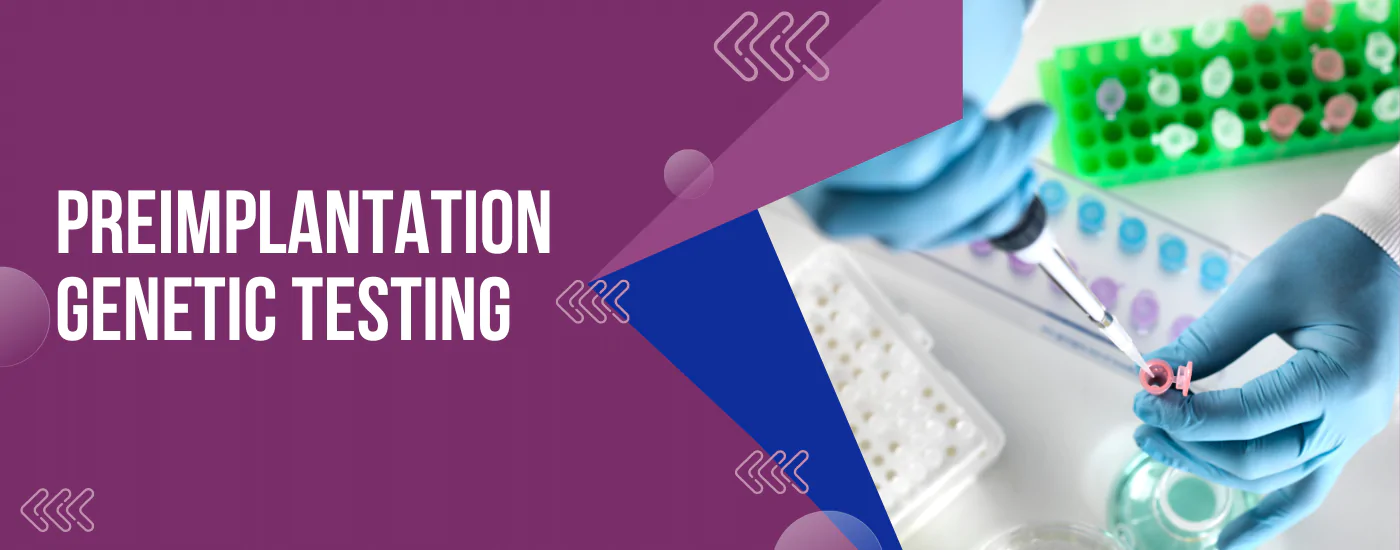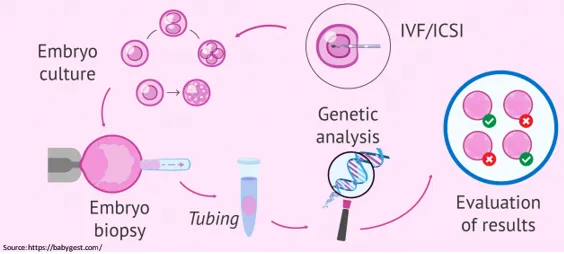
Preimplantation Genetic Testing in Mumbai
Do you or a family member have a hereditary condition?
Are you worried about your child inheriting a genetic disorder?
Preimplantation Genetic Testing (PGT) can aid in detecting genetic abnormalities.
Babies & Us IVF Center offers reliable and result-oriented preimplantation genetic testing in Mumbai. This test helps detect chromosomal abnormalities in the developing embryo before transferring it into the uterus.
Genetic or developmental diseases may result from chromosomal abnormalities. PGT is used with IVF to guarantee that the embryos implanted are good quality and have the best chance of succeeding.
Babies & Us is one of the best IVF center in Mumbai founded by Dr. Hrishikesh Pai, a pioneer in the field of Gynecology, Obstetrics, and Assisted Reproductive Techniques in India.
Our clinic has cutting-edge technology that assists patients in getting a comprehensive diagnosis and most-effective treatment to achieve their dream of parenting a healthy child. In addition to IVF, we also offer advanced reproductive services including ICSI, IMSI, and egg freezing in Mumbai.
Please scroll down to know about preimplantation genetic testing, its types, procedure, cost, and more.
First, let’s know,
What Exactly is Pre Implantation Genetic Testing (PGT)?

When one or both genetic parents are carriers of a hereditary ailment, the doctor recommends preimplantation genetic testing. The test is performed on an embryo to see if it has a genetic issue.
It aids prospective parents in preventing the birth of a child with severe genetic disorders like Thalassemia, Down’s Syndrome, Sickle Cell Anemia, and others.
Now, let’s know the
Maximize your chances of a successful pregnancy with PGT. Learn about our advanced genetic testing services and take control of your family planning.
Types of Preimplantation Genetic Testing
There are three different forms of PGT services, which we will go over briefly below:
1. PGT – A
- Preimplantation Genetic Testing for Aneuploidy (PGT-A) was formerly known as Preimplantation Genetic Screening (PGS). It is a genetic test that screens all 23 pairs of human chromosomes for aneuploidy to detect and transfer euploid (chromosomally normal) embryos.
- Embryos with an inappropriate number of chromosomes can result in an unsuccessful pregnancy or a baby with a genetic disease like Down’s syndrome or Turner’s syndrome.
2. PGT – M
- Preimplantation Genetic Testing for Monogenic (single-gene) Disorders (PGT- M) was formerly known as Preimplantation Genetic Diagnosis (PGD).
- It is a procedure that examines embryos of couples who are at a greater risk of transmitting a known inherited genetic disease caused by mutations in a single gene, such as Sickle cell anemia, Beta-thalassemia, Cystic fibrosis, Huntington’s disease, and other diseases.
3. PGT – SR
- PGT-SR stands for Preimplantation Genetic Testing for Structural Rearrangements was previously known as Preimplantation Genetic Diagnosis for Chromosomal Translocation.
- This approach distinguishes between embryos with the appropriate genetic material and embryos with additional or missing genetic material due to translocation or rearrangement.
- PGT-SR lowers the chances of having a baby with an imbalanced structural defect, leading to miscarriage.
Now that you know the types of PGT, let’s learn more about PGD and PGS.
What is Preimplantation Genetic Diagnosis (PGD), and How does it work?
- Preimplantation genetic diagnosis (PGD) looks for chromosomal abnormalities in your embryos.
In the IVF lab, when eggs and sperms are incubated for a stipulated period, it leads to the fertilization of eggs. The fertilized egg is known as an embryo.
- One or two blastomeres are taken from each embryo and tested. The embryo is transplanted to the uterine cavity if it is clear of the abnormality.
- Embryos are chosen without PGD only based on their visual quality and morphology, which cannot discriminate between chromosomally normal and defective embryos.
- PGD hopes to improve pregnancy and live birth rates by screening your embryos for chromosomal abnormalities.
What is Preimplantation Genetic Screening (PGS), and How does it work?
PGS is a process that involves screening for chromosomal abnormalities in an embryo. Many chromosomal abnormalities in embryos do not lead to pregnancy.
- There will be some chromosomally defective eggs in every woman’s eggs. All men will have some chromosomally defective sperm.
- Many factors, including the parents’ age and health history, can influence the percentage of defective embryos.
Ensure a healthy start to parenthood with PGT. Contact us to discuss how genetic testing can optimize your IVF journey.
Who is a Candidate for Preimplantation Genetic Testing?
- Women beyond the age of 37 (due to a higher risk of faulty embryo genetics with normal reproductive ageing).
- Couples who are at risk of having a child with an inherited genetic disorder.
- Women with a history of chromosomal abnormalities-related miscarriages.
Process of Preimplantation Genetic Testing (PGT)
I am text block. Click edit button to change this text. Lorem ipsum dolor sit amet, consectetur adipiscing elit. Ut elit tellus, luctus nec ullamcorper mattis, pulvinar dapibus leo.
Even if you have no problems conceiving naturally, you will need to undergo the IVF process for preimplantation genetic testing.
- Step 1: A blastocyst is made up of 100-150 cells. The embryos’ cells are biopsied during the PGT procedure. Three to four blastocyst cells are collected and sent for genetic testing. Till then, we will cryopreserve the blastocysts on individually numbered straws after biopsy. The results take about 1 to 2 months to arrive.
- Step 2: We transfer the genetically normal embryo into the uterus after two months. Usually, doctors transfer a single embryo to reduce the risk of multiple births while simultaneously lowering the miscarriage rate. The healthy leftover embryos are frozen and will be utilized if needed in the future. We have used this procedure to assist thalassemia, and sickle cell anemia sufferers have healthy, normal babies.
Cost of Preimplantation Genetic Testing
Babies & Us IVF Center in Mumbai is one of the first clinics to offer preimplantation genetic testing. This is a fairly complex method that necessitates knowledge and skill. Furthermore, we use the latest technology to conduct the tests in our facility.
The cost of PGT depends on various factors, including the type of PGT conducted and the number of embryos that need to be tested.
Success Rate of Preimplantation Genetic Testing
PGT has roughly 95 to 98 percent accuracy for most couples. However, the outcome of the fertility treatment depends on several circumstances, including the couple’s age, overall health, and weight.
Benefits of Preimplantation Genetic Testing
- PGT can screen for over 300 different genetic illnesses.
- It allows couples with a high genetic risk of passing the disease on to their children to have healthy babies, and it can even eliminate sex-linked hereditary disorders.
- It gives a higher pregnancy rate even when only one embryo is transferred, reducing complications associated with multiple pregnancies.
Experience the assurance of PGT in building your family. Connect with our experts to explore how this innovative testing can benefit you.
Frequently Asked Questions
While genetic testing increases the likelihood of transferring a healthy embryo and delivering a healthy kid, no embryo can be guaranteed to implant or develop healthily.
PGS has been demonstrated to be most beneficial in couples who have had repeated miscarriages or failed IVF cycles, as well as women above 35 years who are using their eggs. PGS screening isn’t required for IVF success in women under 35 because their eggs have a low percentage of defective chromosomes.
Because blood samples from the couple and, in some cases, family members must be taken in advance of the IVF cycle, you will need to make your decision well in advance. After collecting all of the DNA samples, the test takes about 8 to 12 weeks.
The biopsy procedure, which takes a few cells from each embryo for the PGT, has a small risk of harming the embryo. In addition, the vitrified embryos must be thawed before being transported to the uterus, which was done during the test.

 In the IVF lab, when eggs and sperms are incubated for a stipulated period, it leads to the fertilization of eggs. The fertilized egg is known as an embryo.
In the IVF lab, when eggs and sperms are incubated for a stipulated period, it leads to the fertilization of eggs. The fertilized egg is known as an embryo. PGS is a process that involves screening for chromosomal abnormalities in an embryo. Many chromosomal abnormalities in embryos do not lead to pregnancy.
PGS is a process that involves screening for chromosomal abnormalities in an embryo. Many chromosomal abnormalities in embryos do not lead to pregnancy.